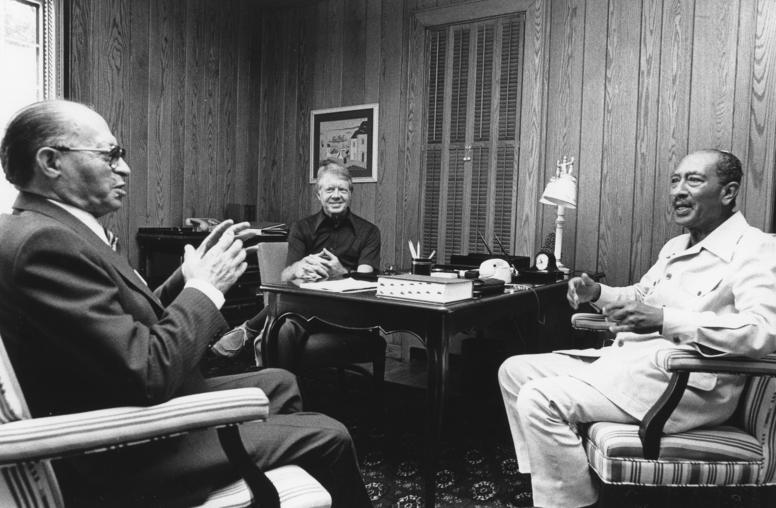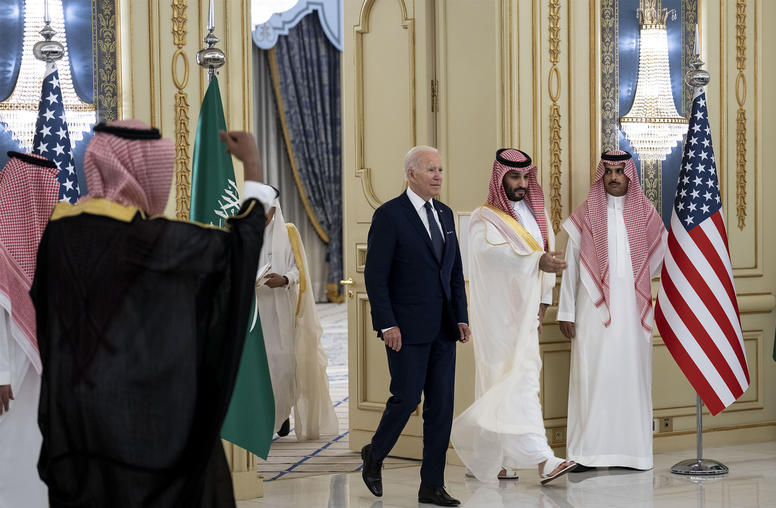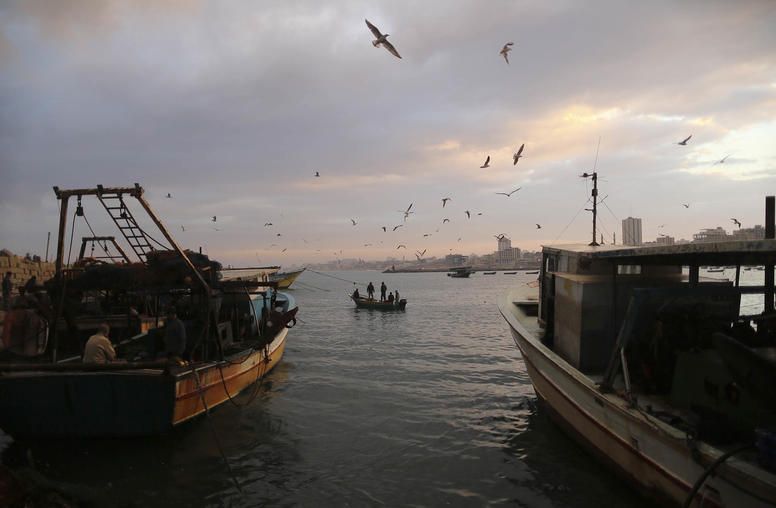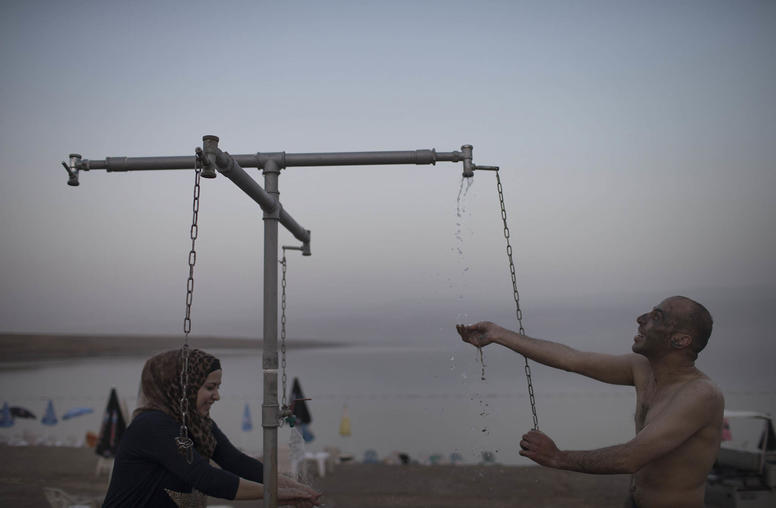Research & Analysis
U.S. Institute of Peace’s articles, reports, tools and other features provide policy analysis, research findings, and practitioner guides. These publications examine critical conflict issues at the center of the Institute’s work to prevent and resolve violent conflict.
The views expressed in these publications are those of the author(s).

Jimmy Carter and the Unfinished Business of the Camp David Accords
President Jimmy Carter’s passing has prompted many reflections on his life and legacy. Few of Carter’s achievements have had as lasting an impact as the 1978 Camp David Accords. Between 1948 and 1978, Egypt and Israel had known nothing but waves of violence and stalemate. After Camp David, the Israeli-Egyptian relationship that was once a key threat to Middle East security became a resilient cornerstone of regional stability.

Five Factors Shaping the Future of Egypt-Israel Relations
The Gaza war has strained Egyptian-Israeli relations to an unprecedented level and raised questions about the future of their 1979 peace treaty that has been a cornerstone of Arab-Israeli peace. U.S. officials met recently in Cairo with their Israeli and Egyptian counterparts against a backdrop of mutually diminishing confidence between the two parties, particularly following Israel’s ground offensive in Rafah. This comes on the heels of a shooting incident between Israeli and Egyptian forces that left at least one Egyptian soldier dead, and Egypt joining South Africa’s case against Israel at the International Court of Justice (ICJ). Along with Qatar, Egypt is a key broker in the current Israel-Hamas cease-fire efforts and engages in extensive security cooperation with the U.S. and Israel.

Six Dilemmas Facing Egypt
Since Hamas took control of Gaza in 2007, Egypt has been heavily involved in efforts to end the military confrontations and wars that have periodically broken out in Gaza. However, the scope, scale and stakes of the current war is unlike any prior round of hostilities. In response to the massacre and hostage-taking of mostly Israeli civilians by Hamas and other militant armed groups during their devastating attack on Israel on October 7, 2023, Israel has launched one of the most destructive wars in its history. Indeed, this war will be transformational in numerous ways, with ramifications for several stakeholders beyond the parties themselves.

How the Israel-Hamas War Impacts Regional Relations
Hours before President Biden was to land in Israel last week, a missile hit Al-Ahli Baptist Hospital in Gaza, killing hundreds of Palestinian civilians in one of the deadliest incidents since this war began. This horrific incident points to a war that is of a different scale and significance than many previous rounds of violent confrontation and that will have reverberations throughout the Middle East. In recent days, tens of thousands of people have taken to the streets in rage and world leaders are calling for the protection of civilians and an immediate cease-fire in the face of the siege and escalating humanitarian crisis in Gaza, resulting in life-threatening shortages of water, electricity, fuel, food and life-saving medical supplies.

Is a Saudi-Israel Normalization Agreement on the Horizon?
In recent months, a drumbeat has built around the U.S. effort to negotiate a normalization agreement between Israel and Saudi Arabia. The deal would be a tectonic shift in Middle East geopolitics, but also carries major implications for other actors beyond the three negotiating parties. Israel would, of course, benefit from normalized relations with the Saudis — long seen as the “holy grail” of potential normalization agreements for the country. The Saudis, in turn, would see their interests advanced through strengthened U.S partnership in key areas. But this deal could also have serious implications for the future of the Palestinian national movement and, further afield, for the role of China in the Middle East.

How a Gaza Marine Deal Could Benefit Palestinians, Israelis and the Region
Amid today’s dismal Israeli-Palestinian context, positive developments have been in short supply. However, Prime Minister Benjamin Netanyahu’s June announcement of preliminary approval for the development of the Gaza Marine gas fields provided a rare glimpse of a potential win-win opportunity. For the Palestinians, it could provide a much-needed boost to their lagging economy and the cash-strapped Palestinian Authority (PA). On the Israeli side, it allows the Netanyahu government to claim it is assisting in improving living conditions in Gaza and could lead to less U.S. pressure on issues like settlement expansion. In the big picture, this is another example of how energy is increasingly becoming a focus for potential win-win agreements in the East Mediterranean.

Regional Actors Seek to Douse Flames Fueled by Jerusalem Tensions
The saying that history doesn’t repeat, but rhymes is no truer than in Jerusalem. Two years have yet to pass since the large-scale escalation that took root in the city morphed into deadly violence between Arab and Jewish citizens of Israel and an Israel-Hamas military escalation that claimed the lives of over 200 Palestinians and 12 Israelis. Now, once again, events in and around Al-Aqsa Mosque during Ramadan have become proximate cause for a cascading series of violent events that have victimized Palestinians and Israelis, and opened another chapter of contested narratives and mutual recriminations.

Takeaways from Blinken’s Trip to the Middle East
The Middle East has not been a high priority for the Biden administration thus far, with issues such as Russia’s war in Ukraine and escalating tensions with China taking precedence. However, recent developments in the region are catching the administration’s attention, and Secretary of State Antony Blinken’s visit to Egypt, Israel and the West Bank earlier this week sought to reaffirm U.S. engagement in the Middle East amid political turnover in Israel, spiraling violence in the Israeli-Palestinian arena, stepped-up Iran-Israel tensions and a deepening economic crisis in Egypt.

Water Can Be a Rare Win-Win for Israelis, Palestinians and the Region
From Israel’s turbulent electoral politics and Palestinian political dysfunction to the cycle of intercommunal violence in the West Bank and the humanitarian catastrophe in Gaza, it’s rare for much good news to come out of the Israeli-Palestinian context these days. But this June, a hopeful story emerged from the impoverished Gaza Strip when its Mediterranean beaches were deemed safe for swimming for the first time in decades.

Could the Israel-Lebanon Maritime Border Deal be a Game-Changer?
Israel, Lebanon and the United States announced this week that a deal has been reached between Israel and Lebanon on each country’s maritime border. Negotiations between the parties over the 330-square-miles of the Mediterranean Sea have proceeded with stops and starts since 2020, but over the past few months edged toward a mutually acceptable outcome. Under the agreement, the contested waters will be divided by a line straddling the “Qana” natural gas field. Both parties would be able to produce gas on their side of the line, in addition to royalty arrangements agreed upon. A buoy line will remain between the two countries.